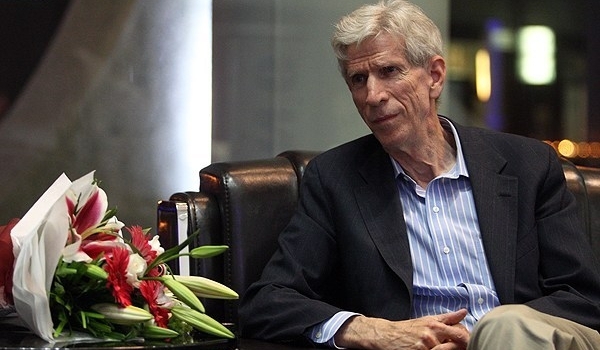 TEHRAN (FNA)- The Persian version of 'Manufactured Crisis: The Untold Story of the Iran Nuclear Scare' translated and published by Fars News Agency (FNA) was unveiled in Tehran on Saturday in a ceremony in the presence of its award-winning writer Gareth Porter as well as senior Iranian officials.
TEHRAN (FNA)- The Persian version of 'Manufactured Crisis: The Untold Story of the Iran Nuclear Scare' translated and published by Fars News Agency (FNA) was unveiled in Tehran on Saturday in a ceremony in the presence of its award-winning writer Gareth Porter as well as senior Iranian officials.The releasing ceremony of the Persian edition of the book, which traces the true history of Iran's nuclear program, as well as how and by whom the official narrative was constructed, was held at the venue of Fars News Agency's central office in Tehran Saturday afternoon.
Head of the Atomic Energy Organization of Iran (AEOI) Ali Akbar Salehi, Iran's former lead negotiator Saeed Jalili, Chairman of the Iranian Parliament's National Security and Foreign Policy Commission Alaeddin Boroujerdi and several Iranian and foreign intellectuals and writers took part in the ceremony.
Gareth Porter is a leading American journalist, historian, anti-war activist and correspondent of the Vietnam War. Porter�s writings have appeared on such publications as The Nation, Inter Press Service, The Huffington Post, Truthout, Al-Jazeera, Press TV, Antiwar.com and Common Dreams. Porter is the 2012 winner of Martha Gellhorn Prize for Journalism, which is awarded annually to a journalist who exposes media propaganda.
Gareth Porter has recently published a book titled 'Manufactured Crisis: The Untold Story of the Iran Nuclear Scare' which discloses the unseen and masked truths behind the decade-long standoff over Iran�s nuclear program. In this book, Porter endeavors to reveal the destructive role Israel has played in the exacerbation of Iran�s relations with the West over the former�s nuclear activities. Porter maintains that Iran�s nuclear program is completely legal and regularly inspected, abused by the United States and Israel as a pretext for pressuring Iran.
In a special introduction to the Persian edition of 'Manufactured Crisis', Porter wrote, "At the heart of the �manufactured crisis� described in the book lies a bitter irony: the United States and its allies have chosen to make accusations of pursuit of nuclear weapons against the one state in the world that is based on a system of Shi�a jurisprudence that has forbidden for decades all weapons of mass destruction in place on religious grounds.� The seriousness of the Iranian jurisprudential prohibition on such weapons was proven by the remarkable story outlined in the book of how Iran was unable to retaliate against the chemical weapons attacks of Iraq because of Ayatollah Khomeini�s fatwa against chemical weapons. It was that fundamental historical fact that convinced me that Iran has indeed abjured the option of nuclear weapons development, as it has always claimed."
"Most readers of this edition will be quite familiar with the role of the hegemonic power that the United States globally and in the Middle East in shaping US policy toward Iran�s nuclear program. I have tried to provide a detailed account of how and why that policy of attempting to strangle Iran�s still nascent nuclear program took shape despite Iran�s intention to rely on western European for its nuclear fuel. The book shows how US policymakers failed to give any thought to the likely consequences of such an aggressive policy toward a country that had already demonstrated its unwillingness to bow down to imperialist efforts to control its development," he added.
"A second feature of US policy toward Iran that I have tried to illuminate is the way that policy has been driven by the narrow political and bureaucratic interests of successive US administrations and their key national security institutions. As I show in this book, from 1989 to 1990 the United States was poised to end its overt hostility toward Iran and accept a legitimate role in regional politics. But the end of the Cold War and the collapse of the Soviet Union left the CIA and the Pentagon without a major threat by which they could justify their extraordinary levels of spending and manpower. In 1991-92, those two institutions came up with the idea that the spread of weapons of mass destruction � especially nuclear weapons in Iran � as the new global threat replacing the Soviet Union. That convenient rationale for their continued power has continued to distort intelligence assessments on Iran�s nuclear program and successive administration�s policy toward Iran ever since. Equally distortive has been the domestic political interest of the Clinton administration and its successors in aligning US policy toward Iran with that of Israel," he added.
"The false narrative about a covert Iranian nuclear weapons program that has underpinned the �manufactured crisis� continues to have dangerous influence on US politics and policy. On one hand the Obama administration�s embrace of that narrative makes it more vulnerable politically to the argument of the Israel lobby in that Iran cannot be trusted to enrich uranium. As a result it has made the arbitrary demand that Iran reduce its enrichment capacity to a minimum. At the same time, it has insisted that Iran explain to the IAEA satisfactorily accusations that are known to have come from Israeli intelligence and for which no confirming evidence has even been claimed," Porter wrote.
"The outcome of the negotiations between Iran and the P5+1 on Iran�s nuclear program and the termination of economic sanctions imposed ostensibly because of that prom remains uncertain as this edition goes to press. What is clear, however, is that the false narrative about Iran�s nuclear program has been used to justify an arbitrary and unjust and aggressive program of economic war against Iran. I am happy that the story behind that US campaign against Iran�s economy is now available to readers in Iran and in the Iranian diaspora," he concluded.
By Fars News Agency
The Iran Project is not responsible for the content of quoted articles.











